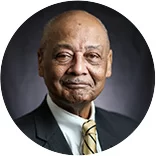
Robert Woodson

Anthony Bradley
Why Understanding Resilience is Key to American Renewal
In Michael Crichton’s thriller The Andromeda Strain, a mysterious alien infection kills the inhabitants of an entire town. As two heroic doctors race against time to defeat the unknown pathogen, they focus on the two individuals who survived the initial infection: an elderly alcoholic and a six-month-old baby. In the end, the survivors’ unique qualities hold the key to defeating the infection and saving humanity.
If The Andromeda Strain had been written about the prevailing efforts to fight poverty and other social problems, the doctors would have spent the entire story studying the corpses of the dead. They would have carefully documented what the victims were doing when they became infected and described in endless detail what their bodies looked like after they succumbed to its ravages. These days, they probably would have investigated whether the plague killed the women a few seconds faster than the men or if people of color lived disproportionately closer to the initial outbreak.
No attention would be paid to the two people whose bodies had defeated the pathogen. We would be told they were such a vanishingly small minority that they could not be considered representative of the whole, and thus their experiences were solely anecdotal.
The problem with any institution devoted to “Poverty Studies” or something similar is that the very name denotes more interest in the disease than in the cure.
From virtue signaling on the left to moralistic preening on the right, few on either side demonstrate sustained curiosity about the unique qualities of the remarkable individuals who experience and then defeat poverty and its numerous associated challenges.
Yet the determination to overcome obstacles and solve problems instead of being defeated by them is a central part of the American character. Since the founding, the innovation and promise of limited government has depended on individuals and communities committed to self-government and thus self-initiated problem-solving. Our Constitution was designed for a barn-raising people, not for those who sit around complaining about the inequitable distribution of barns.
The most tried and true American mechanism for problem-solving is a thriving ecosystem of “voluntary associations,” first documented by Alexis de Tocqueville. Such emergent organizations of human effort built entire towns, addressed an endless variety of social problems, and, notably, enabled countless members of a formerly enslaved race to both survive and thrive in a time when much of the country remained largely hostile to their presence.

For at least 50 years, a viable framework for solutions to the supposedly intractable problems of upward mobility and race has been readily available. AEI’s To Empower People (1977 and 1996) demonstrated the central role that Tocqueville’s human-scale mediating structures play in upward mobility. And the rich history of such institutions’ role as the engine of upward mobility in the black community would speak for itself, if anyone would listen.
Sadly, the overwhelming majority of researchers, policy makers, journalists, academics, and politicians have not listened. Universities and think tanks of all ideological perspectives remain fixated on viewing lower income Americans, and black Americans in particular, through the lens of pathology and assume that the only mechanism of positive change is top-down, “professional” intervention. This tendency to discount agency and self-efficacy of low-income Americans is exacerbated today by the notion that the American polity is hopelessly and thoroughly racist, and that “victimized” individuals and communities stand no chance of success unless massive — and extremely unlikely — revolutionary changes are pursued. No doctrine could be more antithetical to the promise of resilience.
That is why the Woodson Center is launching the Center for the Study of Resilience, to house our 40 years of work with lower income communities, to serve as a virtual repository for the courageous, important, and under resourced resilience research scattered across the country and the world, and to give voice to those grassroots leaders whose work and experience holds the key to the next era of making neighborhood renewal and upward mobility a reality in every corner of America. The center focuses on the principles and methodologies that allow people to succeed and thrive in the face of obstacles, adversity, and tragedy.
The Center for the Study of Resilience will collect both stories and data, working to tease out the causal variables of thriving while keeping the human person at the center of the conversation. It will work to fill gaps in the important and underfunded research being done on resilience across multiple disciplines, while also closing the considerable divide between those who do such research, those who talk about such issues, and those who actually live out resilience on a daily basis.